Justice S Abdul Nazeer demanded,ancient Indian jurisprudence teaching, throw out colonial law system
By Lokmat English Desk | Published: December 28, 2021 08:52 AM2021-12-28T08:52:14+5:302021-12-28T08:52:32+5:30
Supreme Court Justice S Abdul Nazeer demanded ancient yet advanced legal jurisprudence subject for law student on Sunday. He ...

Justice S Abdul Nazeer demanded,ancient Indian jurisprudence teaching, throw out colonial law system
Supreme Court Justice S Abdul Nazeer demanded ancient yet advanced legal jurisprudence subject for law student on Sunday. He said personalities like Manu, Kautilya, Brihaspati and others are worth for studying and emulation.
“There can be no doubt that this colonial legal system is not suitable for the Indian population. The need of the hour is the Indianisation of the legal system. The eradication of such a colonial mindset may take time but I hope that my words will evoke some of you to think deeply about this issue and steps that need to be taken to decolonialise the Indian legal system, he said."
He said the country's future is depend on lawyers and judges, “Such lawyers and judges will only grow from the social soil of India and will be nurtured by its social atmosphere. Great lawyers and judges are not born but are made by proper education and great legal traditions, as were Manu, Kautilya, Katyayana, Brishaspati, Narada, Parashara, Yajnavalkya and other legal giants of ancient India. The continued neglect of their great knowledge and adherence to the alien colonial legal system is detrimental to the goals of our Constitution and against our national interests,” he added.
He further said that the justice was inbuilt in ancient Indian legal system under the power of British colonial system which runs even today, while justice has to be most polite manner.
The judge said under Indian jurisprudence marriage was a duty, and this job has to be performed by everyone, “But, the pre-occupation of western jurisprudence with rights has resulted in marriage being looked upon as an alliance from which each partner tries to get as much as he or she can. The high rate of divorce is the result of neglecting the ‘duty’ aspect of marriage,” he said, adding “the word right (adhikar) does not occur even once in the whole of Anushasan Parva or the Arthasastra. Indian jurisprudence is founded on theories that rights are corollaries of duties.”
Open in app